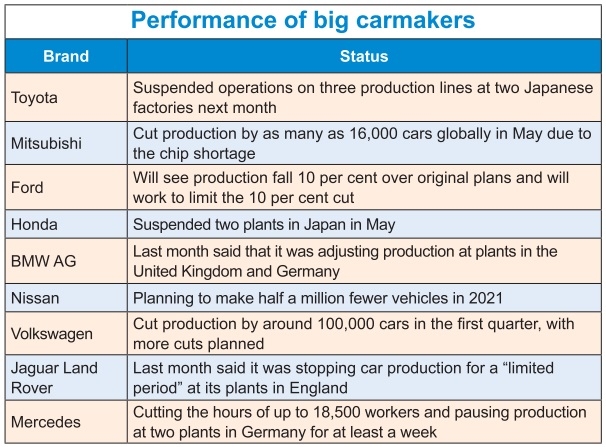Auto trade issues persist amid rise in consumption
Auto trade issues persist amid rise in consumption
Amid a rise in car consumption, a wide range of giant automakers have had to cut production or close facilities due to the global semiconductor shortage that is affecting price and delivery times.
|
According to a new report from the Vietnam Automobile Manufacturers Association (VAMA), in April Vietnamese consumers bought over 30,000 cars, achieving a growth rate of 155 per cent over the same period in 2020. Despite the strong increase in consumption, delivery times have been lengthened due to a shortage of components.
Mitsubishi Vietnam said its car orders have to wait until the end of May if the order was made from mid-April. The group plans to cut output in Japan and Thailand, but has yet to reveal any changes for its facility in the southern province of Binh Duong. Suzuki Vietnam meanwhile officially informed its dealers that a number of XL7 and Ertiga cars will be restricted from being imported in the near future due to the Suzuki factory in Indonesia cutting production.
The Indonesia factory leaders blamed the cut in production on a lack of components. Last month The Jakarta Post reported that car manufacturer PT Suzuki Indomobil Motors had to temporarily suspend operations. Suzuki now assembles light trucks and vans in Vietnam, but all passenger cars are imported from Indonesia and Thailand.
According to the General Department of Vietnam Customs, imports saw a sharp decrease in April at 4,918 units, down nearly 60 per cent on-month, while the average price increased by $8,000.
The number of completely-build-up cars of all kinds registered at customs clearance and imported into Vietnam last month mainly originated from Thailand at just over 2,400 units, Indonesia at 1,200 units, and China with 424 units. The number of cars imported from these markets accounted for over 80 per cent of the total number brought into Vietnam in the month.
VAMA general secretary Ninh Huu Chan said that the semiconductor chip shortage is causing output reduction and pushing prices up. He cited JD Power, a US data analytics and consumer intelligence company, as predicting in late March that the price of each unit will increase from 5-25 per cent. Chan explained the chip shortage is a knock-on effect thanks to increased appetite for smartphones, computers, and other electronic devices during pandemic restrictions, as well as continuing trade tensions between the United States and China.
Japanese carmaker Toyota Motor meanwhile announced last week that it plans to temporarily halt operations at two of its plants in Japan’s northeast in June. This is the first time that output adjustments are being made involving three models – the C-HR and Yaris Cross crossover SUVs as well as the Yaris compact car – because of the semiconductor shortage.
Meanwhile Toyota Vietnam, which sold 5,700 cars, up 96 per cent on-year in April, admitted that its model Corolla Cross is limited in supply.





























